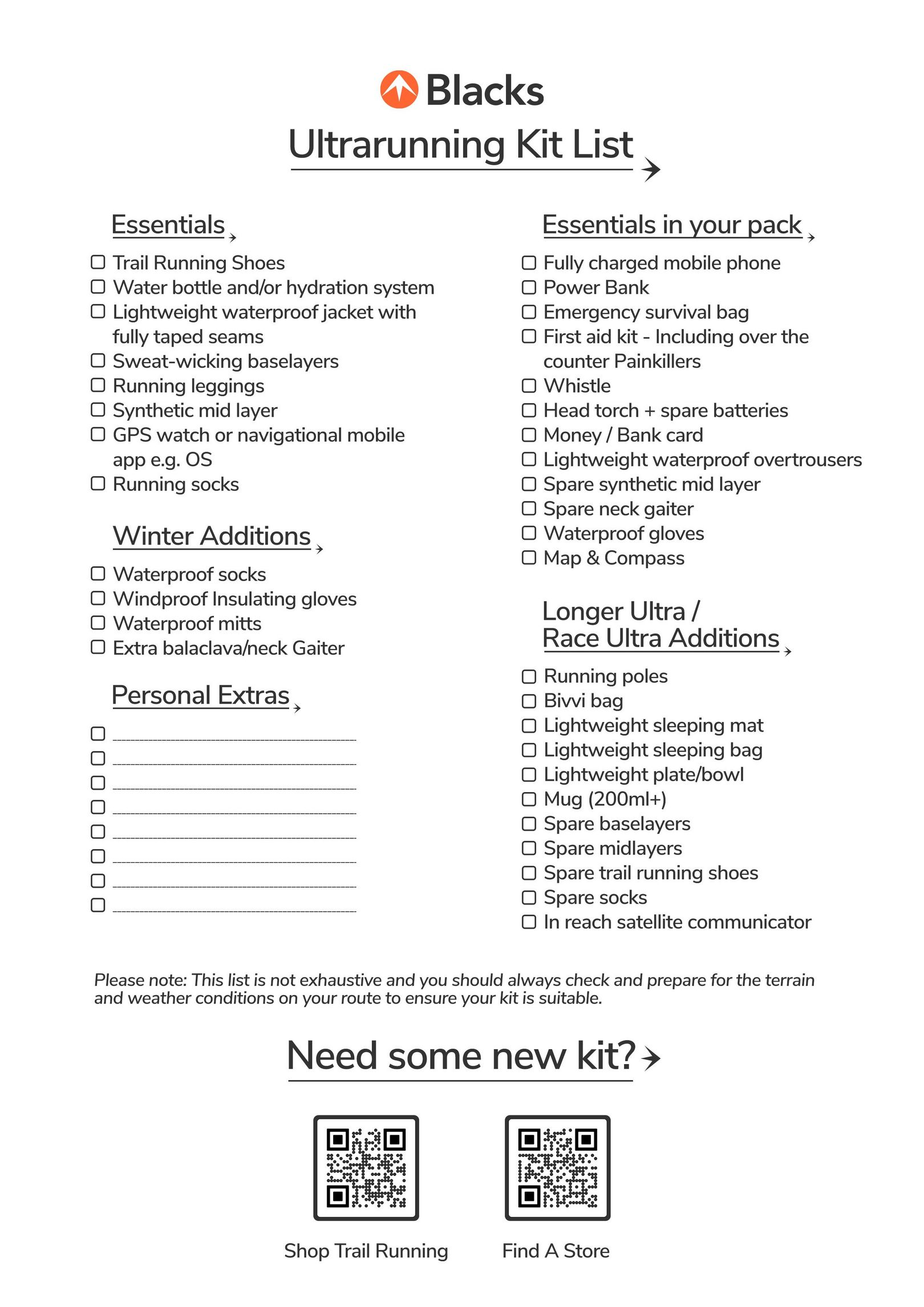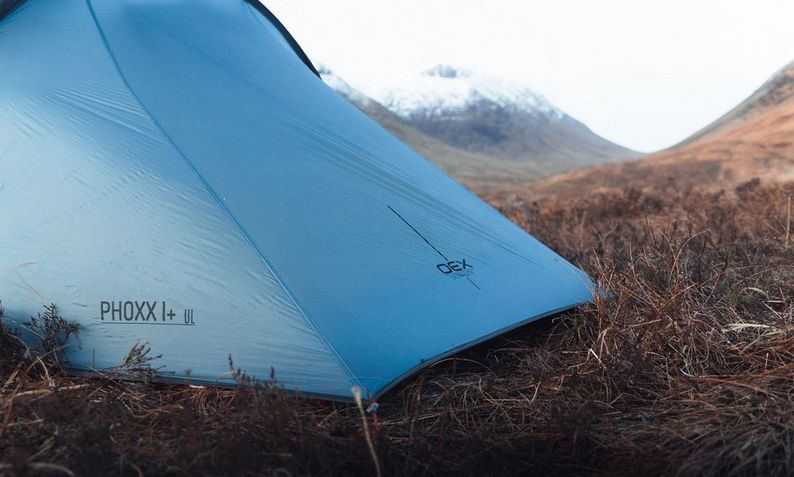
An ultramarathon is the ultimate test of both physical and mental endurance. Described as anything over the regulation marathon length of 26.2 miles, common ultra distances range from 30 miles to 100 and beyond. Every extra mile comes with a new set of challenges for your mind and body to overcome along with a greater sense of accomplishment at the finish line.
You might be wondering what you’ve let yourself in for. That’s normal! We spent a day on the trail with Sarah Perry (Wainwright’s Coast to Coast Female Fastest Known Time holder) and asked for her advice on how to go the distance.

Training for an ultramarathon
If you're thinking about stepping up to ultra distance, it's likely you've already done a marathon. Considering the fact that an ultra is anything over 30 miles, it's not too much more in terms of distance. What is considerably different though, is the terrain and probably the amount of time that you'll be on your feet. One thing that I swear by for building up to ultras is back to back long runs. The length of your back to back runs depends on the distance you're training for and one common misconception is the idea that you need to run for the entire time. Much of my long, hilly runs are a mix of jogging with some hiking mixed in for good measure.
Consistency is key and although trail running is my absolute favourite thing to do, my weekly training also incorporates a lot of road miles as unfortunately this is necessary for me to fit miles in around a busy schedule. I've also started to incorporate some strength and conditioning into my weekly routine and definitely feel stronger because of it. Regardless of how busy I am, I very rarely skip my strength session and see this as an important component in ensuring that I'm 'ultra-ready'.
A coach is a great idea if you're training for something specific, however if you're more open to just having a go and seeing what happens, some excellent training plans can be found online.
Time and dedication go hand in hand. While you might have all the dedication you need, finding the time to train for an ultramarathon around busy work and family commitments can often be a hurdle. During the week I do a fair few road miles, including runs from the house with my dog, Murphy, and my run-commute to work which is about 13-miles out and back. I also try to get a couple of trail runs in during the week. On the weekends I get my long runs in, these are always trail runs and are usually a mix of recceing routes or just exploring somewhere new.
If, like Sarah, you like to train with your dog, we recommend Ruffwear products. Sarah's dog Murphy uses the Ruffwear Webmaster™ Harness which provides ultimate freedom of movement for your canine companion and has multiple leash attachment points so you can put them on a lead when running past roads or livestock.

Preparing for an ultramarathon
By the time you're on the start line for your first ultra, you need to have a plan for your nutrition and hydration, have everything in handy reachable pockets and know where your kit is stashed for every eventuality. Longer training runs are a great opportunity to get used to your ultra kit and practice fuelling well whilst on the move.
Food and hydration
One thing that works for me in terms of nutrition, is to make sure that I have a good mix of savoury and sweet foods as this helps me avoid feeling nauseous. I try to eat and drink every hour as a guide and if I know I'm out for a long time, I will try to focus on eating very well towards the start of the run as it's likely I won't feel able to later on.
Route planning
If possible, I think it's a great idea to recce most of your route, especially if you are taking part in a race or going for an FKT. This takes away the pressure of navigation and means that you can focus on fuelling correctly. Besides that, it means you are free to enjoy running! It's also handy in terms of assessing which shoes will be most suitable and for seeking out potential crew meeting places. If you aren't able to recce the route, do as much research about the route as possible and have a little search on YouTube to see if anyone has posted any relevant videos - you'll be surprised at how much useful content you can find on there!
I have also made the mistake of picking ultras for convenience or because they're a certain distance. What's more important to me now is to pick a route that's beautiful - part of the fun is enjoying being outside in the countryside.
Crew logistics
If I'm hoping for a specific outcome or if I have crew or friends coming to run with me, I will create a schedule. For crew this could just be estimated times at checkpoints and suggested things that I may need, however if a lot of people are involved it's helpful to add as much detail as possible. Trackers can be hired if you are doing a solo event, you are provided with a link so that support runners and crew can track your current location and estimate your arrival time. I think that it's really important to select crew and support runners carefully; it should feel like an epic day out with friends, regardless of whether things are going well or not.

Race day advice
All the details should have been taken care of already and all that's left is to enjoy the moment. I'll have my usual breakfast at least an hour before I start, a couple of cuppas and then just try to make sure I have enough time to relax before I begin my run - I try to not faff about too much and stay off my feet if possible.
Remember – You wanted to do it, you've put hours into training and preparation - go and do it! Sometimes it's the easiest bit. Sometimes it's not, and maybe you'll have to push through that. Any negative feelings are temporary and will soon be forgotten when you've achieved what you set out to do. If the end goal isn't enough to get you through, then I usually try to guilt myself into persevering - spurred on by the thought of my crew sitting in the dark waiting for me at silly o'clock in the morning. I break things down into chunks, just think about getting to the next checkpoint, reward myself with something and then keep moving again.

Sarah's favourite long-distance trails
Wainwright's Coast to Coast – 182 miles
St Bees to Robin Hood's Bay
It snakes over beautiful Lakeland passes, through pretty little Dales villages and over purple moors before you are greeted with the smell of fish and chips at RHB. It really is a route that keeps on giving. My advice for this one would be to take as long as you possibly can to complete it; it's far too beautiful to be done in the dark.
Cleveland Way – 109 miles
Helmsley to Filey
A lovely mix of moorland and coastal paths; much of it is very runnable. Potentially a great option if attempting a solo FKT as there are plenty of amenities, particularly along the coast.
Nidderdale Way – 53 miles
Circular route from Pately Bridge
I almost don't want to share this one as Nidderdale is one of my favourite places. This route takes in (most of) the best bits that the area has to offer and my favourite bits have to be the Northern part of the route, taking in Scar House reservoir and Middlesmoor. This is another one that is well worth doing in the daytime. Give me a wave as you run past!
Lyke Wake Walk – 42 miles
Osmotherly to Ravenscar
This is a particularly runnable yet picturesque route that weaves up and over the Yorkshire Moors. If you're considering this one, pack light and go fast.
Isaac's Tea Trail – 37 miles
A circular route over the Pennines from Allendale
A fun day out with some mixed terrain; come prepared though as despite its name, tea shops are few and far between.
If all else fails, be a trailblazer. Do your own research and create your own routes.
Sarah’s Ultrarunning Kit List
I like to be over prepared and my basic kit is the same whether training on a weekend or running an ultra. When deciding what additional kit to pack for an ultra, it depends on the amount of time I'll be out, the weather, terrain and the amount of support available.
In terms of nutrition and hydration, if I'm running for over 24 hours, I like to plan my nutrition more carefully and eat a variety of sweet and savoury food. Personally, I like to stick to 'real' food and avoid gels and powders, but that’s personal preference.
Here is my current gear list, with a couple of my favourite winter bits of kit too:

Click here to get Sarah's recommended kit list as a printable PDF.


